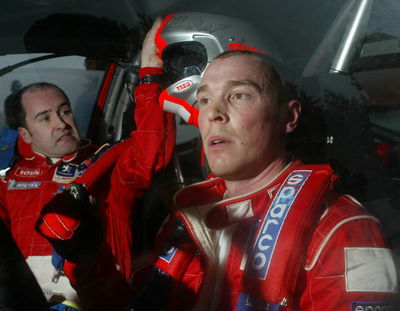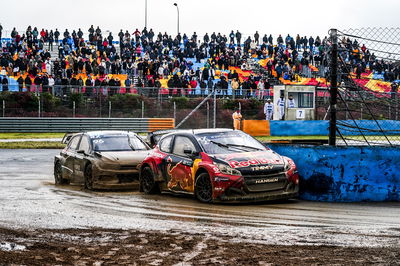Q&A: Robert Reid.
As passenger in the right-hand seat of the World Rally Championship leader's Peugeot 206 WRC, Robert Reid clearly lives a life in the fast lane. But his job is also a way of life; you don't get to become Richard Burns' co-driver by accident! Here prior to the start of Rally Australia Reid reveals what it is like and how he goes about it...
Q:
Does the way you take and read pacenotes differ according to the type of rally or the amount of experience you have of it?

As passenger in the right-hand seat of the World Rally Championship leader's Peugeot 206 WRC, Robert Reid clearly lives a life in the fast lane. But his job is also a way of life; you don't get to become Richard Burns' co-driver by accident! Here prior to the start of Rally Australia Reid reveals what it is like and how he goes about it...
Q:
Does the way you take and read pacenotes differ according to the type of rally or the amount of experience you have of it?
Robert Reid:
No. Prior to this year's Deutschland Rallye, we had done the recce three times - in 2001, 2002 and 2003 - and done the actual event just once. That was amply sufficient. One of the keys to success in rallying today is the ability to take good notes after just two slow runs through a stage and then knowing how to get the most out of them at rally speed. Our basic system suits all situations and has to be both simple and precise. Whatever the difficulty, the note I call has to be instantly and totally identifiable by Richard. It's then down to him to adapt the way he drives according to the type of surface, the weather conditions or the type of tyres we are running on. The musical score itself never changes; it's the driver who interprets it as a function of how he feels at the moment. The better he knows the stage, the faster and safer he will be, but the work for me is always the same.
Q:
When you get back to your hotel after recce, how much time do you spend checking, adjusting and recopying your notes?
RR:
In Germany, after the twenty hours we spent on recce, we spent a further thirteen hours before the start perfecting our notes. On rallies with which we are more familiar, and as long as we have done the stage since 2000, we use the notes from previous years. When our most recent experience dates further back than that, however, we start again from scratch because, with time, the profile of stages can change significantly as roads are repaired and modified.
Q:
Finland is generally considered as the toughest event for co-drivers. What is your approach to it?
RR:
The Finnish stages add a third dimension to your notes, but in fact we keep the way we describe the jumps pretty simple. The only calls we use are 'jump maybe', 'jump' or 'bad jump'. As far as the actual reading of the notes is concerned, Finland is paradoxically a more restful event than many others. On a slow rally such as Cyprus, the corners are so complicated and follow on from each other at such a rate that you never stop speaking, whereas in Finland, the long fast portions where you haven't much to say give you a chance to catch your breath. On the other hand, the timing of each call is critical and requires total concentration. At the sort of speeds we get up to, the slightest lateness in your call can lose you maybe five seconds, or even end up in a big accident. It's the fact that you can't afford to make a mistake that makes this rally so difficult and stressful.
Q:
Yet it's one of the favourites amongst World Championship competitors...
RR:
It's effectively one of my favourite rallies, along with Sweden and New Zealand, which also feature fast, smooth stages. For sure they are very demanding but the thrill is incomparable. Rally Finland's most famous and toughest stage is the 33-kilometre Ouninpohja test and you tend to have a bit of a love-hate relationship with it. When you get to the end, your initial reaction is "Thank goodness that's over!", then after a while you think to yourself "Wow, that was terrific!"
Q:
At that sort of speed, how is it possible to appreciate a stage?
RR:
In fact you only really appreciate it once it's over, when you go over it again in your head. As long as the stopwatch is ticking, all you've got time to do is concentrate on reading the pacenotes. Personally, I practically never note down reference points and I hardly ever lift my eyes from my notes. I am used to feeling the reactions of the car through the seat of my pants, and that's all I need to know exactly where I am in my notes. That may seem unreal for most people, but when you spend something like two hundred days a year sat in the co-driver's seat, it's a sixth sense that comes naturally. Reading 'blind' like this is in fact excellent training for a beginner... on a virtual stage preferably, to avoid undue risks!
Q:
The stages of Rally Australia probably wouldn't be ideal for this sort of exercise...
RR:
You're right. Australia is another fast, interesting rally, with added apprehension when you're first on the road through a stage lined with trees, sweeping aside the marbles that cover the road. Since we are currently leading the World Rally Championship, we will once again be in that position on day one. When it's like that, all you can do is concentrate on keeping the car on the line as much as possible despite its tendency to move about all the time on a surface that offers very little grip. Experience comes in very useful. But every cloud has a silver lining; the fact that we have been leading the championship for so long has given us plenty of opportunity to practice this season!
Q:
When you're running first on the road through stages like those you find in Australia, do you think about the danger?
RR:
Knowing how to cope with all these parameters and accepting the risks is all part of our job. But there is a limit. In the case of Australia, gravel note crews are vital. On last year's event, there was a big patch of mud in the first kilometre of the opening stage. Marcus [Gronholm] was first on the road, and if he hadn't been warned about it by his gravel note crew, then he would almost certainly have gone off, and the consequences of that could have been dramatic. In most rallies, there are at least a couple of places where this sort of accident is a real risk. If you believe it is unacceptable to knowingly expose the first crew on the road to this sort of hazard, then gravel note crews are indispensable.











